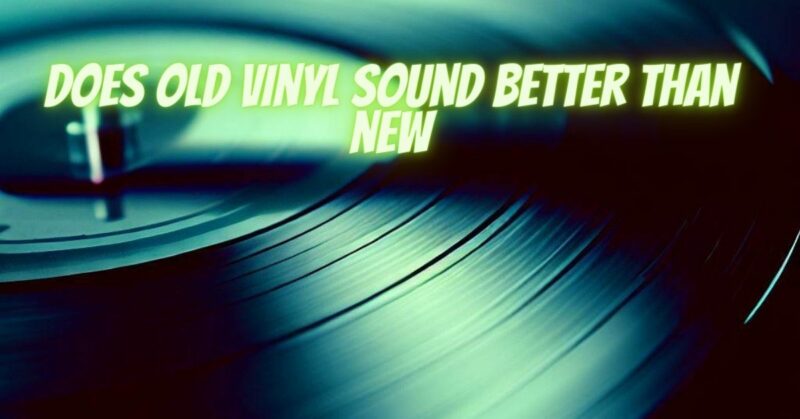Vinyl records, with their warm and nostalgic appeal, have endured through decades of musical evolution. As enthusiasts explore the nuances of analog sound, a persistent question arises: Does old vinyl sound better than new? In this exploration, we delve into the factors influencing the perception of sound quality in vintage and contemporary vinyl records.
The Myth of “Vintage Warmth”:
- Nostalgic Allure: The notion that old vinyl sounds better is often intertwined with a sense of nostalgia. Vinyl records from past decades carry a cultural and historical significance, contributing to a romanticized belief that they possess a unique warmth and character not found in contemporary pressings.
- Wear and Tear: Vintage vinyl records may exhibit wear and tear, including surface noise, clicks, and pops. Some enthusiasts argue that these imperfections contribute to the character of the sound, creating a unique listening experience that cannot be replicated by pristine, new vinyl records.
Factors Influencing Sound Quality:
- Vinyl Formulas and Pressing Techniques: The vinyl manufacturing process has evolved over the years, with advancements in vinyl formulas, mastering techniques, and pressing technology. Modern vinyl records benefit from improved materials and precision mastering, potentially leading to cleaner sound reproduction.
- Mastering Practices: The mastering process significantly influences the sound quality of vinyl records. While vintage records may have been subject to mastering techniques of their time, contemporary mastering practices often leverage advanced technology to achieve optimal audio fidelity, dynamic range, and low noise.
Vinyl Record Storage and Care:
- Environmental Impact: The condition of a vinyl record is paramount to its sound quality. Vintage records that have been well-preserved and stored in optimal conditions may indeed offer a delightful listening experience. However, records subjected to poor storage conditions over the years may suffer from warping, surface damage, and degradation.
- Care and Maintenance: Proper care and maintenance play a crucial role in the longevity and sound quality of vinyl records. Both vintage and new records benefit from meticulous handling, regular cleaning, and appropriate storage to ensure an optimal listening experience.
Subjectivity in Sound Preferences:
- Individual Taste: Sound preferences are highly subjective, varying from one listener to another. Some audiophiles appreciate the perceived warmth and character of vintage vinyl, while others prefer the clean and detailed sound offered by well-mastered contemporary pressings.
- System Compatibility: The playback system, including the turntable, stylus, and amplification equipment, contributes significantly to the overall sound quality. Ensuring compatibility between the playback system and the specific characteristics of the vinyl records being played is crucial for an accurate and enjoyable listening experience.
The belief that old vinyl sounds inherently better than new is a complex and subjective matter. While vintage records carry a sense of nostalgia and may offer a unique sonic character, modern advancements in vinyl manufacturing and mastering practices have elevated the potential sound quality of new vinyl records. Ultimately, the preference for vintage or new vinyl comes down to individual taste, the condition of the records, and the compatibility with one’s audio system. As the vinyl resurgence continues, the exploration of both vintage and contemporary pressings adds richness to the diverse and evolving landscape of analog sound.


